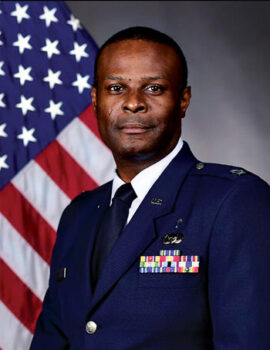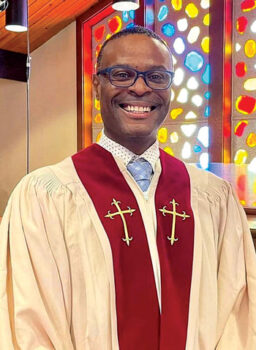
Chaplain, Captain, Derrick Elliott

Pastor Derrick Elliott
Reverend Derrick Elliott, Pastor, Sun Lakes United Church of Christ
My congregation knows me as Pastor Derrick, and I wear the traditional apparel doing worship service; regular Arizona business casual attire in the office, but they also know me as Chaplain Elliott, a chaplain in the Air Force Reserve. In the last two weeks of May, I was among the people when we honored our women and men in uniform, past (Memorial Day) and current (Armed Forces Day). We express our deepest gratitude for their service in safeguarding our freedoms. For those members who made the ultimate sacrifice, we recognize and honor that solemn day of observance with reverence. We all know so well the outcomes of war. The destruction of persons, places, and things, has a lasting effect on people and nations—those unimaginable deep wounds, visible and invisible.
I am a doctoral candidate enrolled in the ministry program at Wesley Theological Seminary, Washington, D.C. A couple of semesters ago, I took The Chaplain’s Role in Healing Moral Injury course. In this course, I examined the causes and consequences of Moral Injury in service members, how Moral Injury differs from Post-Traumatic Stress Disorder (PTSD), and the role of the chaplain and command teams (Spiritual Leader and Faith Communities) in preventing and healing Moral Injury. There have been many different approaches to identifying and responding to Moral Injury.
Pastor Derrick, what is Moral Injury? Thanks for asking that question! The term Moral Injury was coined by Psychiatrist Jonathan Shay who worked with veterans of the war in Vietnam, who first coined the term Moral Injury in 1994. Moral Injury occurs as “the result when soldiers violate their core moral beliefs, and in evaluating their behavior negatively, they feel they no longer live in a reliable, meaningful world and can no longer be regarded as decent human beings.”
Moral Injury is an invisible wound. Moral Injury affects each person differently; however, there are some signs and symptoms, unlike a broken leg where you can easily see and provide care. However, there are some signs and symptoms of Moral Injury. They, at times, would often have feelings of grief, guilt, remorse, shame, outrage, and despair. They lose trust in themselves and their moral compass. Their relationships may intersect because they cannot be sure others will not judge them, and they become self-isolated.
As a faith community, we need to be an advocate for our service members. To help them with the resources, trained professionals, i.e., chaplains, mental health, and other agencies, help in their recovery. Without support, the invisible wounds can impact relationships with family, friends, and the community. In Isaiah 41:10, God says to “fear not, for I am with you; be not dismayed, for I am your God; I will strengthen you, I will help you, I will uphold you with my righteous right hand.” They are not alone in the reality of human pain.
You can contact me at Sun Lakes United Church of Christ, 480-895-6317, or contact Be Connected, 866-429-8387, to start your healing journey.
